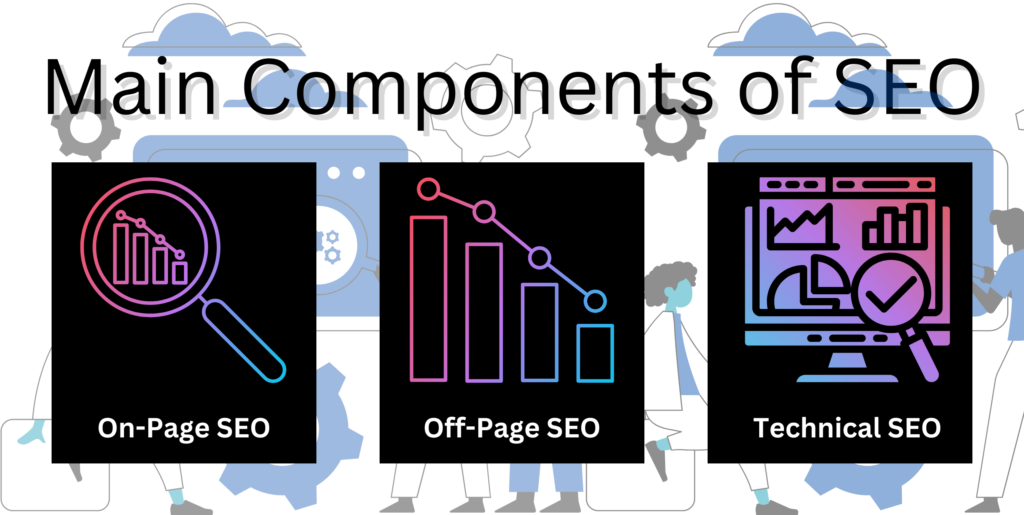Understanding SEO: Definition, Importance, and Best Practices

Search Engine Optimization, or SEO, is a fundamental pillar of digital marketing that aims to enhance website visibility within search engine results pages, and SERPs. This complete guide will cover what SEO is, why it matters to business people and content creators, and best practices for implementing the right SEO strategy.
What is SEO?

SEO is an acronym that stands for Search Engine Optimization, and it refers to the process of fine-tuning a website or a specific web page to enhance its visibility and ranking on various search engines such as Google, Bing, and Yahoo. The main objective or primary goal of SEO is to draw in organic traffic, which is traffic that is unpaid, by significantly improving both the quality and quantity of visitors to the website through the implementation of a range of diverse optimization techniques.
Search Engine Optimization, or SEO, encompasses a set of practices that are specifically designed to help search engines understand the intricate content of a website and its general relevance to specific user queries. This multi-layered process includes optimizing content itself and improving the site’s architecture for easier navigation, enhancing the user experience for greater enjoyment, and strategically building backlinks from other quality sites on the internet.
Main Components of SEO

- On-Page SEO: This is the detailed process of optimizing every single webpage for better ranking within search engine results and getting more relevant traffic from interested users. On-page SEO consists of many important tasks such as content quality enhancement on the page, effective use of keywords throughout the page, and optimizing several HTML tags, such as title tags, meta tags, and header tags. Additionally, it includes the optimization of images to be displayed more effectively and making sure that internal links are used appropriately for easy navigation and flow in the website.
- Off-Page SEO: Off-page SEO refers to a group of actions performed outside of your website to influence your rankings in the competitive landscape of search engine result pages. This approach primarily revolves around the most critical task of creating backlinks originating from other good-quality websites, which can further improve your site’s overall authority as well as its trustworthiness among search engines and users.
- Technical SEO: This is a type of search engine optimization focused mainly on improving and refining technical facets and aspects of a website for the explicit purpose of ensuring search engines can crawl through and index it efficiently without any technical flaws. Technical SEO ranges over, but is not limited to, site speed optimization that aids in improving user experience, being mobile-friendly for any number of users accessing it on different mobiles and devices, ensuring security by implementing HTTPS protocol and by structuring data, allowing better access to search engines for relevant information.
Why it is best Practices
There are myriad reasons why SEO matters :
- Higher Visibility: With higher rankings in SERPs, your website will eventually be more visible to the internet. It has been noticed that most users usually opt for the first few search results they encounter during a search; hence, attaining the top position in such a list can significantly increase the amount of traffic visiting your website.
- Organic Traffic: Organic traffic, which is generated through the process of Search Engine Optimization, also referred to as SEO, costs nothing at all. While it should be noted that one can only expect to see results from the various efforts that go into SEO after a very long time, the long-term benefits are quite significant since they include a steady flow of traffic that requires no continuous financial input.
- Better User Experience: Effective SEO practices significantly improve the overall user experience by making websites much easier to navigate and providing relevant and engaging content. Moreover, a well-optimized website tends to hold visitors for longer periods, which in turn leads to a noticeable reduction in bounce rates.
- Brand Credibility and Trust: In most cases, websites that have higher rankings in search results are usually perceived as more credible and trustworthy by users encountering them. Good SEO is important because it has an important role in establishing and maintaining authority within your specific niche market.
- Cost-Effective Marketing: If we compare SEO with paid marketing strategies like PPC, it can be seen that SEO gives much higher ROI over a longer term. Moreover, it gets users who are actively looking for the exact products or services you are offering.
- Competitive Advantage: In the fast-changing and highly competitive digital landscape, businesses that consciously decide to invest in search engine optimization, or SEO, can gain a significant competitive edge and advantage over those companies that choose not to optimize their online presence and visibility.
How Do Search Engines Work?
To fully understand how SEO functions effectively, it is essential to grasp and comprehend the fundamental ways in which search engines operate and function:
- Crawling: The search engines use a sophisticated automated program, known as crawlers or spiders, that is specifically used to discover new content available on the vast expanse of the internet. These intelligent crawlers move seamlessly through the web by meticulously following hyperlinks from one webpage to another, thereby allowing them to gather information efficiently.
- Indexing: Once the crawlers successfully locate and identify relevant content, they start analyzing the material in detail, and then store the necessary information in an extensive database, which is commonly referred to as an index. This extensive index, therefore, serves as a critical reference point for search engines during the time of user queries, as it enables them to fetch and display the right results based on user input.
- Ranking: Each time a person types in a search for anything, be it an idea or an object, the engine has to find and display relevant content related to the subject from its huge index. How this is done is all through complex and advanced algorithms taking into account a vast selection of ranking factors such as relevance, the authority of a content source, and the overall experience of the user related to the results returned.
SEO Evolution
SEO has a history that traces its beginning in the mid-1990s. That was when search engines were becoming popular on the internet, and it was also when the webmasters concentrated most of their efforts on simple optimization techniques, which include methods like keyword stuffing, the inclusion of meta tags, which are just snippets of text to describe what is on the page. Time has passed, and so have search engines as they have improved. Some of these significant algorithm changes include Google’s Panda in 2011 and Penguin in 2012. In this scenario, SEO practices have changed towards more quality content creation and the adoption of ethical link-building practices, which means improving the fine art of effective online presence.
In this present age of constant change and innovation, one has to implement a multidisciplinary approach that balances technical know-how and creative content strategy to engage audiences and improve rankings.
Best Practices for Effective SEO
To achieve optimal results from your SEO efforts, consider implementing the following best practices:
- Conduct Thorough Keyword Research: Identifying the right keywords is crucial for effective on-page optimization. Use tools like Google Keyword Planner or SEMrush to find relevant keywords with high search volume but manageable competition.
- Optimize On-Page Elements: Make sure every page has its title tags, meta descriptions, header tags (H1-H6), and alt text on images. Use your main keywords naturally in your content while keeping it readable.
- Quality Content: The content needs to be informative, interesting, and relevant to the readers. It should be broad articles answering common questions or problems of your niche.
- Speed Up Your Website: A fast site enhances user experience and benefits the rankings. Use tools such as Google PageSpeed Insights to check the speed of your website and determine what can be done better.
- Mobile-Friendliness: More and more, people access websites from their mobile devices. For users, for ranking, and therefore very important to have a responsive design.
- Build Quality Backlinks: Concentrate your efforts on getting backlinks specifically from authoritative and relevant websites that operate in your industry by guest blogging, forming partnerships, or creating high-quality shareable content that other websites will find valuable enough to link back to.
- Technical SEO Techniques: Implement structured data markup, often called schema, to help search engines better understand the nature of your content, which will in turn increase its visibility in SERPs by way of rich snippets that can attract more attention.
- Regular Monitoring of Performance: Leverage highly effective analytics tools like Google Analytics or Ahrefs to systematically track and monitor the performance of your website over an extended period of time. Then, take the time to deeply analyze key metrics such as organic traffic growth, bounce rates, and conversion rates in order to refine and improve your overall strategy consistently.
Search Engine Optimization, often abbreviated as SEO, is a very important and integral part of the present digital marketing methodologies. This method of optimization alone not only gives tremendous visibility throughout the internet but also improves the user experience while further establishing and developing brand loyalty among customers. When businesses understand deeply how search engines work and deploy optimization techniques wisely in other areas of your website, then they get the power of organic search to grow at incredible speeds, furthering long-term success in digital media.
In other words, investing in SEO does not come easy; however, the benefits far outweigh the initial time and effort in the long run. This is because it helps to position businesses favorably against an increasingly competitive online landscape.
Instagram: digi.specta
Facebook: Digispecta
